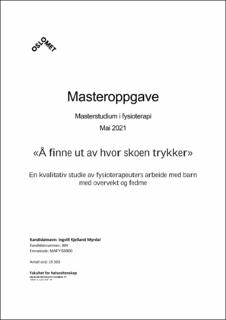«Å finne ut av hvor skoen trykker» En kvalitativ studie av fysioterapeuters arbeide med barn med overvekt og fedme
Master thesis
Published version
Permanent lenke
https://hdl.handle.net/11250/2837318Utgivelsesdato
2021Metadata
Vis full innførselSamlinger
Sammendrag
«Å finne ut av hvor skoen trykker» - en kvalitativ studie av fysioterapeuters arbeide med barn med overvekt og fedme
Bakgrunn: Verdens helseorganisasjon anser overvekt og fedme som et stort folkehelseproblem. Helsedirektoratet har utviklet nasjonale faglige retningslinjene for forebygging og behandling av overvekt og fedme hos barn og unge. Her er kostholdsendring og økt fysisk aktivitet sentralt. Retningslinjene peker på fysioterapeuter som viktige i dette arbeidet. Foreliggende forskning viser begrensede resultater på tiltak og intervensjoner. Det foreligger lite forskning på fysioterapeuters erfaringer med å jobbe med dette feltet.
Hensikt: Hensikten med masteroppgaven er å belyse hvilke refleksjoner et utvalg fysioterapeuter i primærhelsetjenesten har om sitt ansvar og sine arbeidsoppgaver i møte med barn med overvekt og fedme, og herunder hvordan fysioterapeuters erfaringer aktualiserer innholdet i de nasjonale faglige retningslinjene for forebygging, utredning og behandling av overvekt og fedme hos barn og unge.
Teori og metode: Oppgaven anlegger et profesjonsteoretisk perspektiv og anvender begreper fra ulike kunnskapsparadigmer i fysioterapien. Studien er kvalitativ basert på semistrukturerte dybdeintervjuer av syv fysioterapeuter i primærhelsetjenesten. Dataene er analysert etter inspirasjon fra Braun og Clarce (2006) sin tematiske analyse.
Resultater og diskusjon: Resultatene viser at deltagerne er samstemte om at de som profesjon er viktige i arbeidet med barn med overvekt og fedme, og at deres hovedoppgave innenfor feltet er å fremme fysisk aktivitet og bevegelsesglede. Samtidig er de usikre på om det de har å tilby er tilstrekkelig i møte med kompleks livsstilsproblematikk. De etterlyser tydeligere føringer for hvordan fysioterapeuter kan jobbe med barn med overvekt og fedme i praksis. Livsstilsproblematikk stiller krav til deltagerne som profesjonutøvere. Selv om deltagerne ønsker å se helhetlig på barnet, vender de allikevel tilbake til de mer objektive biomedisinske forståelsene i møte med barna og familiene. Fysioterapeuter manøvrer i et helsevesen hvor kravene til profesjonene stadig er i endring og deltagerne utfordres av dette.
Konklusjon: Deltagerne arbeider med utgangspunkt i ulike kunnskapsparadigmer. På den ene siden er de preget av det biomedisinske kunnskapsparadigme, og på den andre siden psykososiale tilnærminger. Fysioterapiprofesjonens fragmenterte kunnskapsbase utfordrer deltagerne på å arbeide ut ifra en samlet og helhetlig kunnskapsplattform i møte med barn og unge med overvekt og fedme. “How to know where the shoe pinches” - a qualitative study of physiotherapists' work with overweight and obese children
Background: The World Health Organization considers overweight and obesity as a major public health problem. The Norwegian Directorate of Health has developed national professional guidelines for prevention and treatment for overweight and obesity in children and adolescents. Increased physical activity and change in diet are keywords in the guidelines, and physiotherapists are considered as an important profession in this field. The present research shows limited results in treatment and interventions. There is a lack of research available on physiotherapists' experiences of working in this field.
Objective: This master's thesis aims to explore how a selection of physiotherapists working in the primary care reflects about their responsibilities and way of working facing children with overweight and obesity, including how their experiences actualize the content of the national professional guidelines for prevention and treatment for overweight and obesity in children and adolescents.
Theory and method: Using a professional theoretical perspective and concepts from different knowledge paradigms in physiotherapy, the study draws on a qualitative approach using semi-structured interviews of seven physiotherapists working in the primary health care service. The material is analyzed using thematic analysis based on Braun and Clarce (2006).
Results and discussion: There were broad agreement among the participants that they considered themselves important in the interventions for children with overweight and obesity. Their considered to promote physical activity and enjoyment of movement to be their main task in this field. At the same time, they are unsure whether what they have to offer is sufficient facing complex lifestyle issues. They demand clearer guidelines for suggestion how physiotherapists are expected to face overweight and obese children in their clinical practice. Lifestyle change place demands on the participants as professionals. Although the participants want to see the child holistically, they still return to the more objective biomedical understandings working with the children and their families. Physiotherapists maneuver in an ever-changing healthcare system, where the requirements for the professions are constantly in change and the participants are challenged by this.
Conclusion: The participants work from different knowledge paradigms. They are characterized by the biomedical model, but they are also using psychosocial approaches. The physiotherapy profession's knowledgebase is fragmented, and this challenges participants to work from a comprehensive and holistic knowledge platform in encounters with children and adolescents with overweight and obesity.
